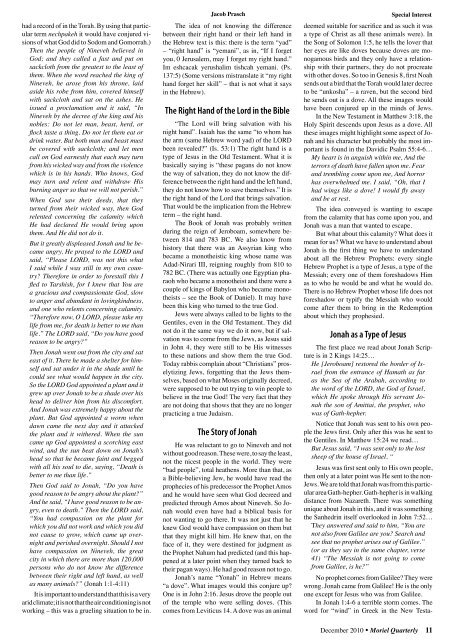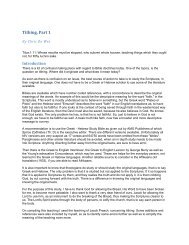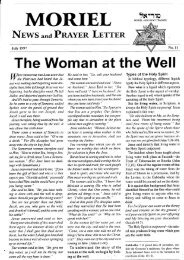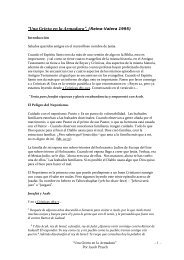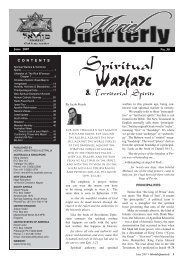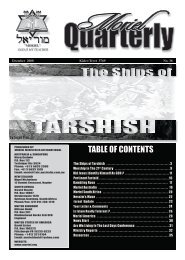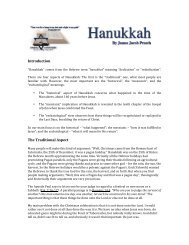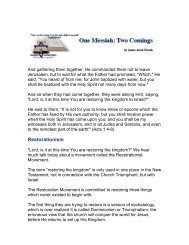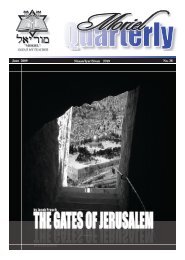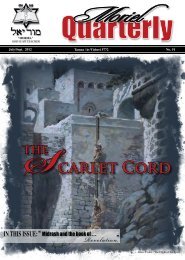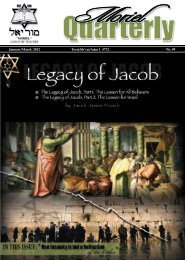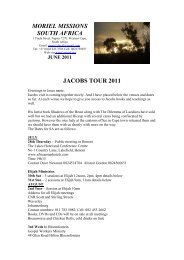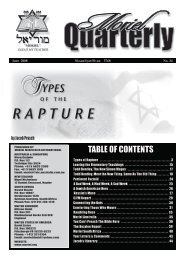Ephesus - Moriel Ministries
Ephesus - Moriel Ministries
Ephesus - Moriel Ministries
You also want an ePaper? Increase the reach of your titles
YUMPU automatically turns print PDFs into web optimized ePapers that Google loves.
had a record of in the Torah. By using that particular<br />
term nechpakeh it would have conjured visions<br />
of what God did to Sodom and Gomorrah.)<br />
Then the people of Nineveh believed in<br />
God; and they called a fast and put on<br />
sackcloth from the greatest to the least of<br />
them. When the word reached the king of<br />
Nineveh, he arose from his throne, laid<br />
aside his robe from him, covered himself<br />
with sackcloth and sat on the ashes. He<br />
issued a proclamation and it said, “In<br />
Nineveh by the decree of the king and his<br />
nobles: Do not let man, beast, herd, or<br />
flock taste a thing. Do not let them eat or<br />
drink water. But both man and beast must<br />
be covered with sackcloth; and let men<br />
call on God earnestly that each may turn<br />
from his wicked way and from the violence<br />
which is in his hands. Who knows, God<br />
may turn and relent and withdraw His<br />
burning anger so that we will not perish.”<br />
When God saw their deeds, that they<br />
turned from their wicked way, then God<br />
relented concerning the calamity which<br />
He had declared He would bring upon<br />
them. And He did not do it.<br />
But it greatly displeased Jonah and he became<br />
angry. He prayed to the LORD and<br />
said, “Please LORD, was not this what<br />
I said while I was still in my own country<br />
Therefore in order to forestall this I<br />
fled to Tarshish, for I knew that You are<br />
a gracious and compassionate God, slow<br />
to anger and abundant in lovingkindness,<br />
and one who relents concerning calamity.<br />
“Therefore now, O LORD, please take my<br />
life from me, for death is better to me than<br />
life.” The LORD said, “Do you have good<br />
reason to be angry”<br />
Then Jonah went out from the city and sat<br />
east of it. There he made a shelter for himself<br />
and sat under it in the shade until he<br />
could see what would happen in the city.<br />
So the LORD God appointed a plant and it<br />
grew up over Jonah to be a shade over his<br />
head to deliver him from his discomfort.<br />
And Jonah was extremely happy about the<br />
plant. But God appointed a worm when<br />
dawn came the next day and it attacked<br />
the plant and it withered. When the sun<br />
came up God appointed a scorching east<br />
wind, and the sun beat down on Jonah’s<br />
head so that he became faint and begged<br />
with all his soul to die, saying, “Death is<br />
better to me than life.”<br />
Then God said to Jonah, “Do you have<br />
good reason to be angry about the plant”<br />
And he said, “I have good reason to be angry,<br />
even to death.” Then the LORD said,<br />
“You had compassion on the plant for<br />
which you did not work and which you did<br />
not cause to grow, which came up overnight<br />
and perished overnight. Should I not<br />
have compassion on Nineveh, the great<br />
city in which there are more than 120,000<br />
persons who do not know the difference<br />
between their right and left hand, as well<br />
as many animals” (Jonah 1:1-4:11)<br />
It is important to understand that this is a very<br />
arid climate; it is not that the air conditioning is not<br />
working – this was a grueling situation to be in.<br />
Jacob Prasch<br />
The idea of not knowing the difference<br />
between their right hand or their left hand in<br />
the Hebrew text is this: there is the term “yad”<br />
– “right hand” is “yemani”, as in, “If I forget<br />
you, 0 Jerusalem, may I forget my right hand.”<br />
Im eshcacak yerushalim tishcah yemani. (Ps.<br />
137:5) (Some versions mistranslate it “my right<br />
hand forget her skill” – that is not what it says<br />
in the Hebrew).<br />
The Right Hand of the Lord in the Bible<br />
“The Lord will bring salvation with his<br />
night hand”. Isaiah has the same “to whom has<br />
the arm (same Hebrew word yad) of the LORD<br />
been revealed” (Is. 53:1) The right hand is a<br />
type of Jesus in the Old Testament. What it is<br />
basically saying is “these pagans do not know<br />
the way of salvation, they do not know the difference<br />
between the right hand and the left hand,<br />
they do not know how to save themselves.” It is<br />
the right hand of the Lord that brings salvation.<br />
That would be the implication from the Hebrew<br />
term – the right hand.<br />
The Book of Jonah was probably written<br />
during the reign of Jeroboam, somewhere between<br />
814 and 783 BC. We also know from<br />
history that there was an Assyrian king who<br />
became a monotheistic king whose name was<br />
Adad-Nirari III, reigning roughly from 810 to<br />
782 BC. (There was actually one Egyptian pharaoh<br />
who became a monotheist and there were a<br />
couple of kings of Babylon who became monotheists<br />
– see the Book of Daniel). It may have<br />
been this king who turned to the true God.<br />
Jews were always called to be lights to the<br />
Gentiles, even in the Old Testament. They did<br />
not do it the same way we do it now, but if salvation<br />
was to come from the Jews, as Jesus said<br />
in John 4, they were still to be His witnesses<br />
to these nations and show them the true God.<br />
Today rabbis complain about “Christians” proselytizing<br />
Jews, forgetting that the Jews themselves,<br />
based on what Moses originally decreed,<br />
were supposed to be out trying to win people to<br />
believe in the true God! The very fact that they<br />
are not doing that shows that they are no longer<br />
practicing a true Judaism.<br />
The Story of Jonah<br />
He was reluctant to go to Nineveh and not<br />
without good reason. These were, to say the least,<br />
not the nicest people in the world. They were<br />
“bad people”, total heathens. More than that, as<br />
a Bible-believing Jew, he would have read the<br />
prophecies of his predecessor the Prophet Amos<br />
and he would have seen what God decreed and<br />
predicted through Amos about Nineveh. So Jonah<br />
would even have had a biblical basis for<br />
not wanting to go there. It was not just that he<br />
knew God would have compassion on them but<br />
that they might kill him. He knew that, on the<br />
face of it, they were destined for judgment as<br />
the Prophet Nahum had predicted (and this happened<br />
at a later point when they turned back to<br />
their pagan ways). He had good reason not to go.<br />
Jonah’s name “Yonah” in Hebrew means<br />
“a dove”. What images would this conjure up<br />
One is in John 2:16. Jesus drove the people out<br />
of the temple who were selling doves. (This<br />
comes from Leviticus 14. A dove was an animal<br />
deemed suitable for sacrifice and as such it was<br />
a type of Christ as all these animals were). In<br />
the Song of Solomon 1:5, he tells the lover that<br />
her eyes are like doves because doves are monogamous<br />
birds and they only have a relationship<br />
with their partners, they do not procreate<br />
with other doves. So too in Genesis 8, first Noah<br />
sends out a bird that the Torah would later decree<br />
to be “unkosha” – a raven, but the second bird<br />
he sends out is a dove. All these images would<br />
have been conjured up in the minds of Jews.<br />
In the New Testament in Matthew 3:18, the<br />
Holy Spirit descends upon Jesus as a dove. All<br />
these images might highlight some aspect of Jonah<br />
and his character but probably the most important<br />
is found in the Davidic Psalm 55:4-6…<br />
My heart is in anguish within me, And the<br />
terrors of death have fallen upon me. Fear<br />
and trembling come upon me, And horror<br />
has overwhelmed me. I said, “Oh, that I<br />
had wings like a dove! I would fly away<br />
and be at rest.<br />
The idea conveyed is wanting to escape<br />
from the calamity that has come upon you, and<br />
Jonah was a man that wanted to escape.<br />
But what about this calamity What does it<br />
mean for us What we have to understand about<br />
Jonah is the first thing we have to understand<br />
about all the Hebrew Prophets: every single<br />
Hebrew Prophet is a type of Jesus, a type of the<br />
Messiah; every one of them foreshadows Him<br />
as to who he would be and what he would do.<br />
There is no Hebrew Prophet whose life does not<br />
foreshadow or typify the Messiah who would<br />
come after them to bring in the Redemption<br />
about which they prophesied.<br />
Jonah as a Type of Jesus<br />
Special Interest<br />
The first place we read about Jonah Scripture<br />
is in 2 Kings 14:25…<br />
He [Jeroboam] restored the border of Israel<br />
from the entrance of Hamath as far<br />
as the Sea of the Arabah, according to<br />
the word of the LORD, the God of Israel,<br />
which He spoke through His servant Jonah<br />
the son of Amittai, the prophet, who<br />
was of Gath-hepher.<br />
Notice that Jonah was sent to his own people<br />
the Jews first. Only after this was he sent to<br />
the Gentiles. In Matthew 15:24 we read…<br />
But Jesus said, “I was sent only to the lost<br />
sheep of the house of Israel. “<br />
Jesus was first sent only to His own people,<br />
then only at a later point was He sent to the non-<br />
Jews. We are told that Jonah was from this particular<br />
area Gath-hepher. Gath-hepher is in walking<br />
distance from Nazareth. There was something<br />
unique about Jonah in this, and it was something<br />
the Sanhedrin itself overlooked in John 7:52…<br />
They answered and said to him, “You are<br />
not also from Galilee are you Search and<br />
see that no prophet arises out of Galilee.”<br />
(or as they say in the same chapter, verse<br />
41) “The Messiah is not going to come<br />
from Galilee, is he”<br />
No prophet comes from Galilee They were<br />
wrong. Jonah came from Galilee! He is the only<br />
one except for Jesus who was from Galilee.<br />
In Jonah 1:4-6 a terrible storm comes. The<br />
word for “wind” in Greek in the New Testa-<br />
December 2010 • <strong>Moriel</strong> Quarterly 11


